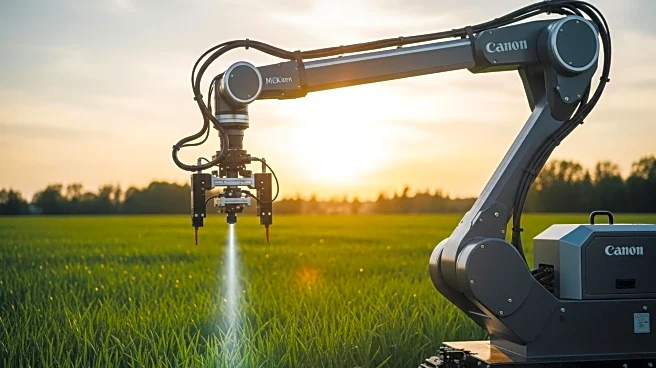What's Happening?
Carbon Robotics, an American start-up, has introduced its LaserWeeder technology to the European market, following its initial launch in the United States. The LaserWeeder uses laser beams to eliminate weeds, offering an alternative to chemical weed control, which is under increasing scrutiny worldwide. The technology has been adopted by a few farmers in the Netherlands, providing early insights into its effectiveness and economic viability. The LaserWeeder employs high-resolution cameras and AI software to identify and target weeds, using lasers to destroy them. This system is capable of operating autonomously and is already in use across more than 100 crop types, primarily vegetables. The machine's introduction in Europe marks a significant step in sustainable farming practices, as it reduces the need for manual labor and chemical herbicides.
Why It's Important?
The introduction of the LaserWeeder in Europe represents a significant advancement in sustainable agriculture, addressing the growing demand for environmentally friendly farming solutions. By reducing reliance on chemical herbicides, the LaserWeeder supports efforts to minimize environmental impact and promote healthier ecosystems. For farmers, the technology offers a potential reduction in labor costs and an increase in crop yield, as it allows for precise weed control without damaging crops. The high initial investment may be a barrier for some, but the long-term savings and environmental benefits could outweigh the costs. As the technology becomes more widespread, it could lead to a shift in agricultural practices, encouraging more farmers to adopt high-tech solutions for weed management.
What's Next?
As the LaserWeeder gains traction in Europe, more farmers are likely to consider its adoption, especially as the technology proves its effectiveness in various crop types. Carbon Robotics plans to continue expanding its market presence, with new orders already placed for 2026. The company is also working on a second-generation model with improved laser technology, which promises greater efficiency and reduced maintenance. As the technology evolves, it may become more accessible to a broader range of farmers, potentially leading to a significant reduction in chemical herbicide use across the agricultural sector.
Beyond the Headlines
The adoption of the LaserWeeder could have broader implications for the agricultural industry, including shifts in labor dynamics and the potential for increased automation in farming. As more farmers adopt this technology, there may be a reduced need for manual labor, which could impact employment in rural areas. Additionally, the success of the LaserWeeder could spur further innovation in agricultural technology, encouraging the development of new solutions for sustainable farming. The move towards high-tech, environmentally friendly farming practices aligns with global efforts to combat climate change and promote sustainable development.











